An Analysis of Leadership and Management at CORUS Steel: A Report
VerifiedAdded on 2023/01/19
|14
|4439
|58
Report
AI Summary
This report delves into the significance of leadership and management within CORUS Steel, a part of the TATA Steel group, focusing on its role in driving organizational success. It begins by differentiating between leaders and managers, outlining their respective roles and characteristics, and comparing their functions. The report then examines how these roles are executed in diverse conditions, such as staff turnover and the implementation of new technologies. Several leadership theories, including Contingency, Transformational, and Transactional theories, are analyzed in the context of CORUS. Furthermore, the report explores the key approaches to operations management and the impact of leaders and managers on operational decision-making. Finally, it discusses the importance of CORUS's operations management in fulfilling business objectives and maintaining a competitive edge in the global steel market.
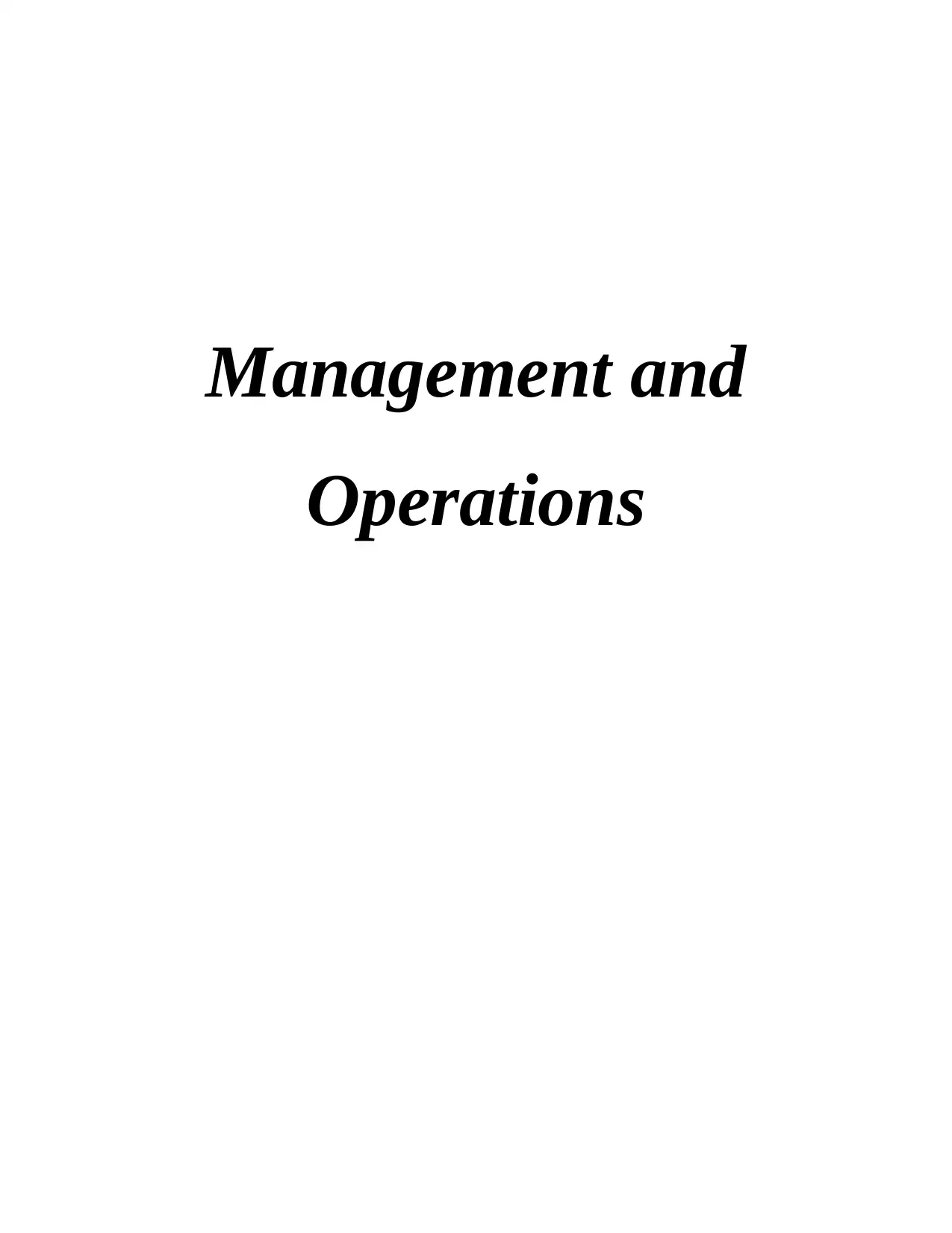
Management and
Operations
Operations
Paraphrase This Document
Need a fresh take? Get an instant paraphrase of this document with our AI Paraphraser
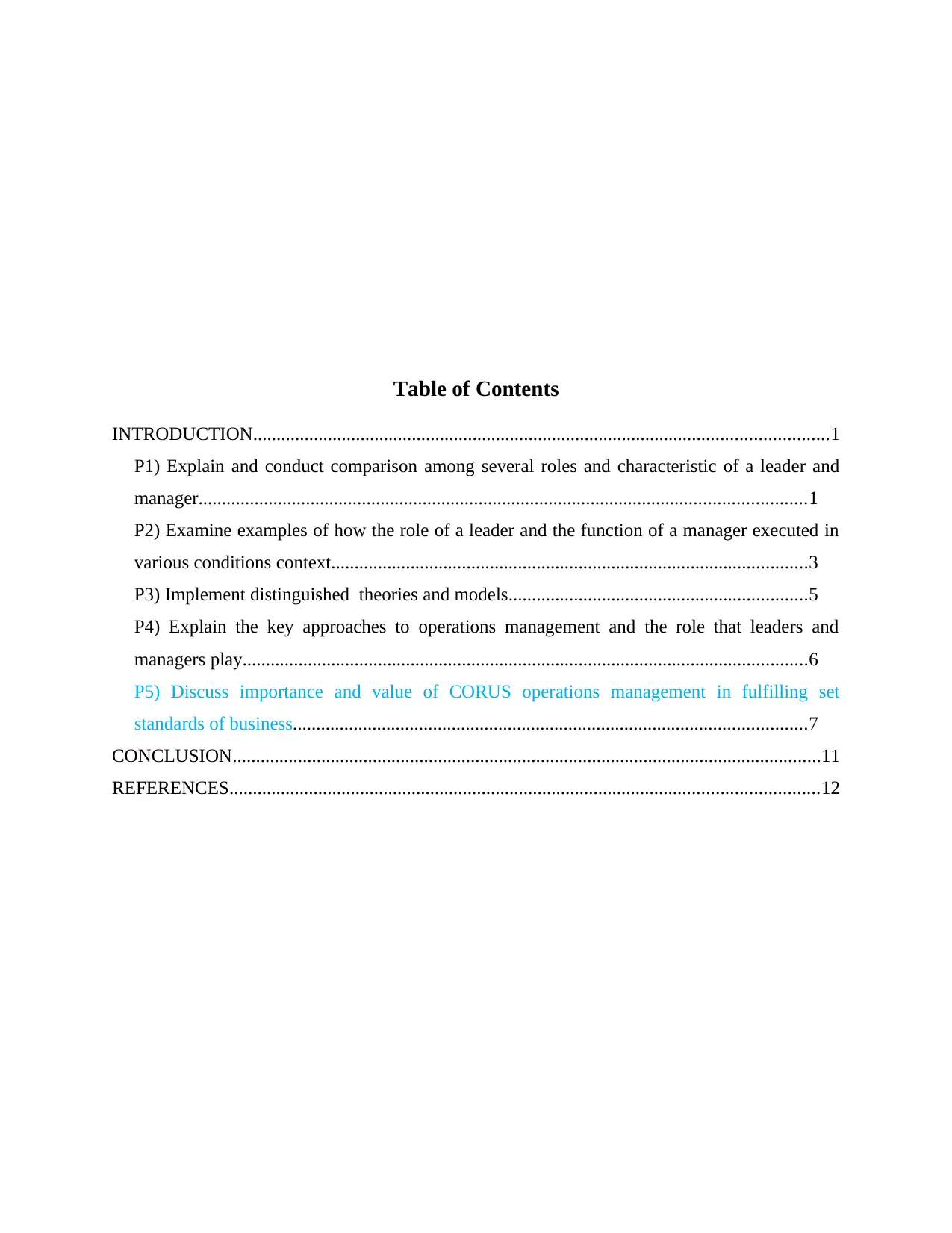
Table of Contents
INTRODUCTION...........................................................................................................................1
P1) Explain and conduct comparison among several roles and characteristic of a leader and
manager..................................................................................................................................1
P2) Examine examples of how the role of a leader and the function of a manager executed in
various conditions context......................................................................................................3
P3) Implement distinguished theories and models................................................................5
P4) Explain the key approaches to operations management and the role that leaders and
managers play.........................................................................................................................6
P5) Discuss importance and value of CORUS operations management in fulfilling set
standards of business..............................................................................................................7
CONCLUSION..............................................................................................................................11
REFERENCES..............................................................................................................................12
INTRODUCTION...........................................................................................................................1
P1) Explain and conduct comparison among several roles and characteristic of a leader and
manager..................................................................................................................................1
P2) Examine examples of how the role of a leader and the function of a manager executed in
various conditions context......................................................................................................3
P3) Implement distinguished theories and models................................................................5
P4) Explain the key approaches to operations management and the role that leaders and
managers play.........................................................................................................................6
P5) Discuss importance and value of CORUS operations management in fulfilling set
standards of business..............................................................................................................7
CONCLUSION..............................................................................................................................11
REFERENCES..............................................................................................................................12
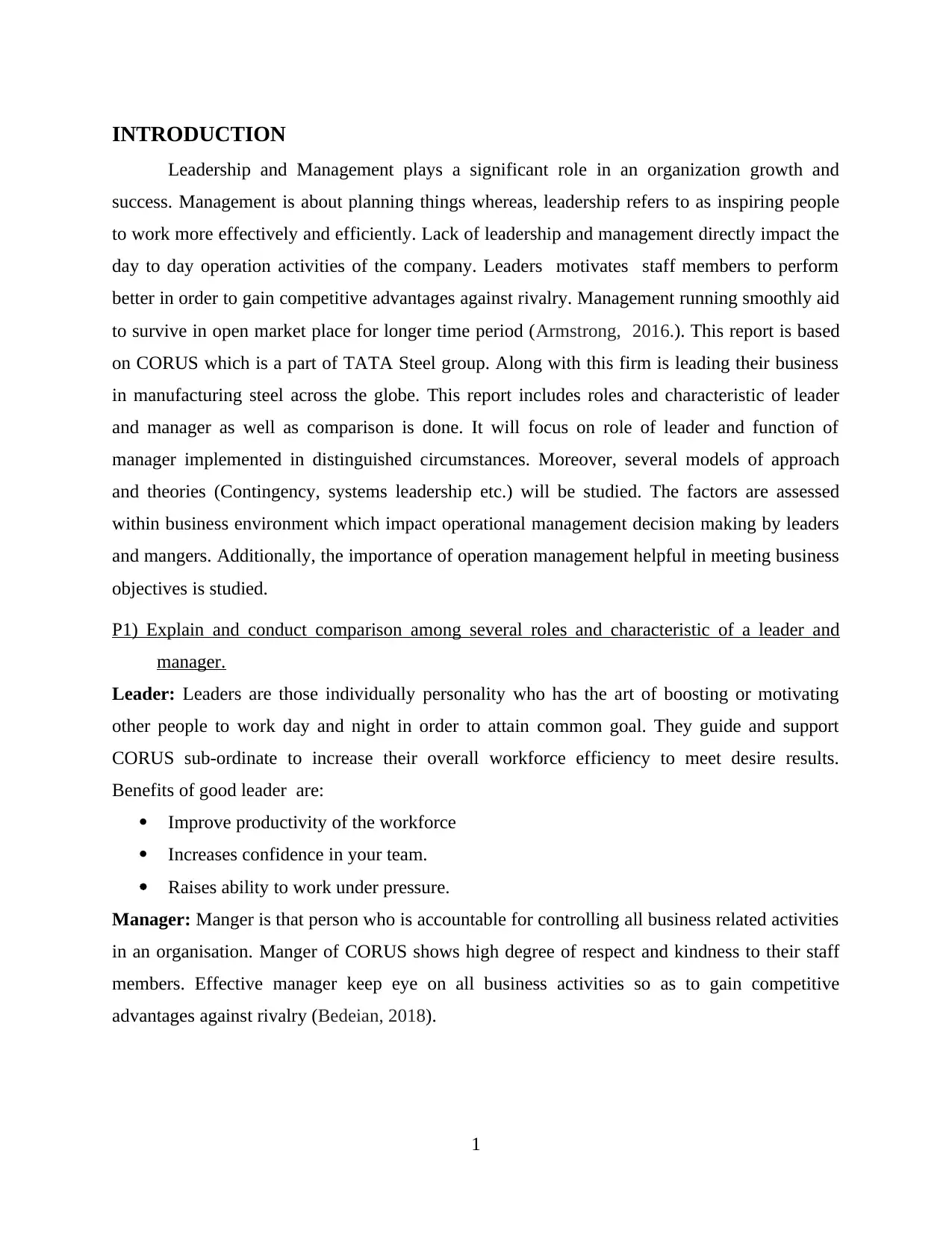
INTRODUCTION
Leadership and Management plays a significant role in an organization growth and
success. Management is about planning things whereas, leadership refers to as inspiring people
to work more effectively and efficiently. Lack of leadership and management directly impact the
day to day operation activities of the company. Leaders motivates staff members to perform
better in order to gain competitive advantages against rivalry. Management running smoothly aid
to survive in open market place for longer time period (Armstrong, 2016.). This report is based
on CORUS which is a part of TATA Steel group. Along with this firm is leading their business
in manufacturing steel across the globe. This report includes roles and characteristic of leader
and manager as well as comparison is done. It will focus on role of leader and function of
manager implemented in distinguished circumstances. Moreover, several models of approach
and theories (Contingency, systems leadership etc.) will be studied. The factors are assessed
within business environment which impact operational management decision making by leaders
and mangers. Additionally, the importance of operation management helpful in meeting business
objectives is studied.
P1) Explain and conduct comparison among several roles and characteristic of a leader and
manager.
Leader: Leaders are those individually personality who has the art of boosting or motivating
other people to work day and night in order to attain common goal. They guide and support
CORUS sub-ordinate to increase their overall workforce efficiency to meet desire results.
Benefits of good leader are:
Improve productivity of the workforce
Increases confidence in your team.
Raises ability to work under pressure.
Manager: Manger is that person who is accountable for controlling all business related activities
in an organisation. Manger of CORUS shows high degree of respect and kindness to their staff
members. Effective manager keep eye on all business activities so as to gain competitive
advantages against rivalry (Bedeian, 2018).
1
Leadership and Management plays a significant role in an organization growth and
success. Management is about planning things whereas, leadership refers to as inspiring people
to work more effectively and efficiently. Lack of leadership and management directly impact the
day to day operation activities of the company. Leaders motivates staff members to perform
better in order to gain competitive advantages against rivalry. Management running smoothly aid
to survive in open market place for longer time period (Armstrong, 2016.). This report is based
on CORUS which is a part of TATA Steel group. Along with this firm is leading their business
in manufacturing steel across the globe. This report includes roles and characteristic of leader
and manager as well as comparison is done. It will focus on role of leader and function of
manager implemented in distinguished circumstances. Moreover, several models of approach
and theories (Contingency, systems leadership etc.) will be studied. The factors are assessed
within business environment which impact operational management decision making by leaders
and mangers. Additionally, the importance of operation management helpful in meeting business
objectives is studied.
P1) Explain and conduct comparison among several roles and characteristic of a leader and
manager.
Leader: Leaders are those individually personality who has the art of boosting or motivating
other people to work day and night in order to attain common goal. They guide and support
CORUS sub-ordinate to increase their overall workforce efficiency to meet desire results.
Benefits of good leader are:
Improve productivity of the workforce
Increases confidence in your team.
Raises ability to work under pressure.
Manager: Manger is that person who is accountable for controlling all business related activities
in an organisation. Manger of CORUS shows high degree of respect and kindness to their staff
members. Effective manager keep eye on all business activities so as to gain competitive
advantages against rivalry (Bedeian, 2018).
1
⊘ This is a preview!⊘
Do you want full access?
Subscribe today to unlock all pages.

Trusted by 1+ million students worldwide
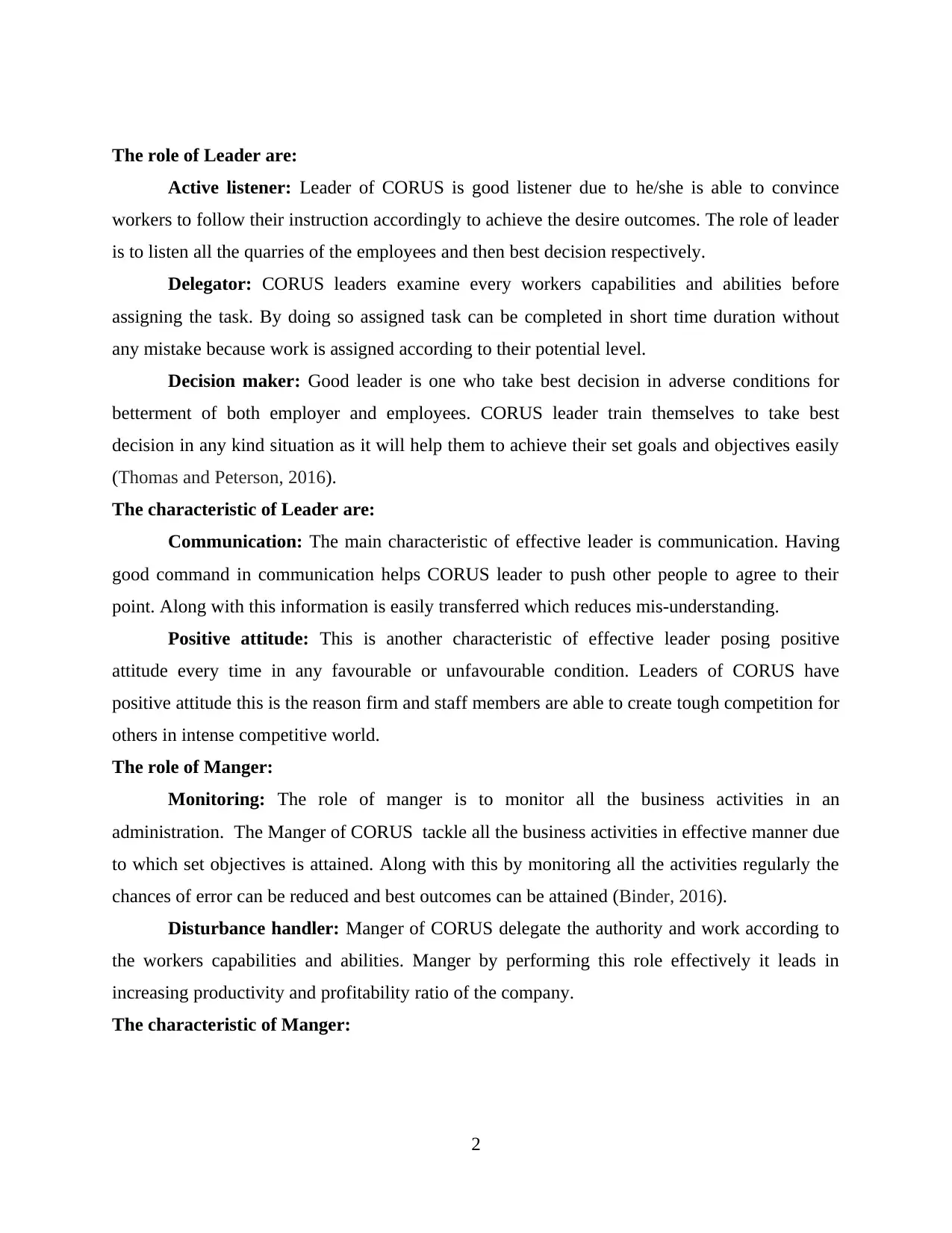
The role of Leader are:
Active listener: Leader of CORUS is good listener due to he/she is able to convince
workers to follow their instruction accordingly to achieve the desire outcomes. The role of leader
is to listen all the quarries of the employees and then best decision respectively.
Delegator: CORUS leaders examine every workers capabilities and abilities before
assigning the task. By doing so assigned task can be completed in short time duration without
any mistake because work is assigned according to their potential level.
Decision maker: Good leader is one who take best decision in adverse conditions for
betterment of both employer and employees. CORUS leader train themselves to take best
decision in any kind situation as it will help them to achieve their set goals and objectives easily
(Thomas and Peterson, 2016).
The characteristic of Leader are:
Communication: The main characteristic of effective leader is communication. Having
good command in communication helps CORUS leader to push other people to agree to their
point. Along with this information is easily transferred which reduces mis-understanding.
Positive attitude: This is another characteristic of effective leader posing positive
attitude every time in any favourable or unfavourable condition. Leaders of CORUS have
positive attitude this is the reason firm and staff members are able to create tough competition for
others in intense competitive world.
The role of Manger:
Monitoring: The role of manger is to monitor all the business activities in an
administration. The Manger of CORUS tackle all the business activities in effective manner due
to which set objectives is attained. Along with this by monitoring all the activities regularly the
chances of error can be reduced and best outcomes can be attained (Binder, 2016).
Disturbance handler: Manger of CORUS delegate the authority and work according to
the workers capabilities and abilities. Manger by performing this role effectively it leads in
increasing productivity and profitability ratio of the company.
The characteristic of Manger:
2
Active listener: Leader of CORUS is good listener due to he/she is able to convince
workers to follow their instruction accordingly to achieve the desire outcomes. The role of leader
is to listen all the quarries of the employees and then best decision respectively.
Delegator: CORUS leaders examine every workers capabilities and abilities before
assigning the task. By doing so assigned task can be completed in short time duration without
any mistake because work is assigned according to their potential level.
Decision maker: Good leader is one who take best decision in adverse conditions for
betterment of both employer and employees. CORUS leader train themselves to take best
decision in any kind situation as it will help them to achieve their set goals and objectives easily
(Thomas and Peterson, 2016).
The characteristic of Leader are:
Communication: The main characteristic of effective leader is communication. Having
good command in communication helps CORUS leader to push other people to agree to their
point. Along with this information is easily transferred which reduces mis-understanding.
Positive attitude: This is another characteristic of effective leader posing positive
attitude every time in any favourable or unfavourable condition. Leaders of CORUS have
positive attitude this is the reason firm and staff members are able to create tough competition for
others in intense competitive world.
The role of Manger:
Monitoring: The role of manger is to monitor all the business activities in an
administration. The Manger of CORUS tackle all the business activities in effective manner due
to which set objectives is attained. Along with this by monitoring all the activities regularly the
chances of error can be reduced and best outcomes can be attained (Binder, 2016).
Disturbance handler: Manger of CORUS delegate the authority and work according to
the workers capabilities and abilities. Manger by performing this role effectively it leads in
increasing productivity and profitability ratio of the company.
The characteristic of Manger:
2
Paraphrase This Document
Need a fresh take? Get an instant paraphrase of this document with our AI Paraphraser
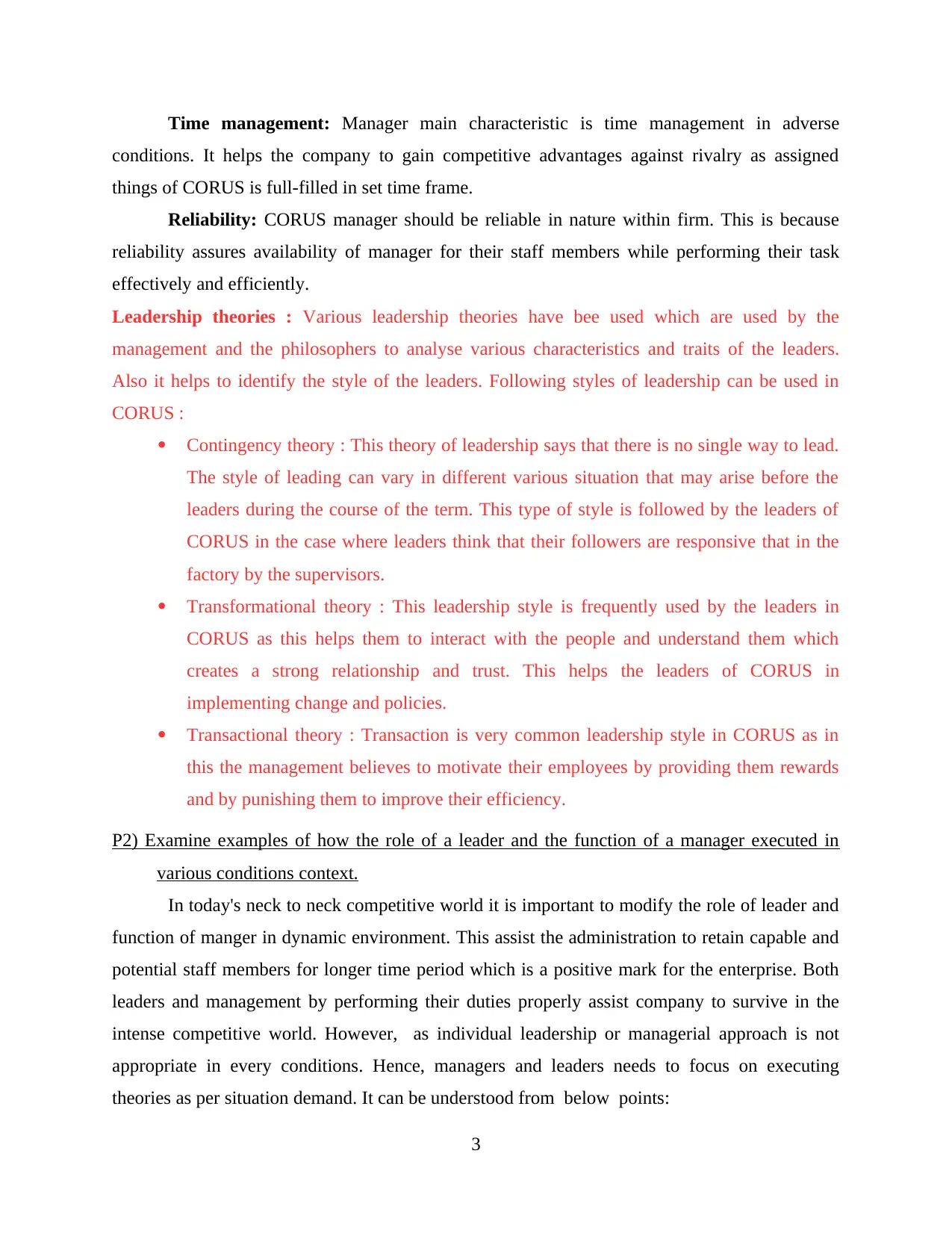
Time management: Manager main characteristic is time management in adverse
conditions. It helps the company to gain competitive advantages against rivalry as assigned
things of CORUS is full-filled in set time frame.
Reliability: CORUS manager should be reliable in nature within firm. This is because
reliability assures availability of manager for their staff members while performing their task
effectively and efficiently.
Leadership theories : Various leadership theories have bee used which are used by the
management and the philosophers to analyse various characteristics and traits of the leaders.
Also it helps to identify the style of the leaders. Following styles of leadership can be used in
CORUS :
Contingency theory : This theory of leadership says that there is no single way to lead.
The style of leading can vary in different various situation that may arise before the
leaders during the course of the term. This type of style is followed by the leaders of
CORUS in the case where leaders think that their followers are responsive that in the
factory by the supervisors.
Transformational theory : This leadership style is frequently used by the leaders in
CORUS as this helps them to interact with the people and understand them which
creates a strong relationship and trust. This helps the leaders of CORUS in
implementing change and policies.
Transactional theory : Transaction is very common leadership style in CORUS as in
this the management believes to motivate their employees by providing them rewards
and by punishing them to improve their efficiency.
P2) Examine examples of how the role of a leader and the function of a manager executed in
various conditions context.
In today's neck to neck competitive world it is important to modify the role of leader and
function of manger in dynamic environment. This assist the administration to retain capable and
potential staff members for longer time period which is a positive mark for the enterprise. Both
leaders and management by performing their duties properly assist company to survive in the
intense competitive world. However, as individual leadership or managerial approach is not
appropriate in every conditions. Hence, managers and leaders needs to focus on executing
theories as per situation demand. It can be understood from below points:
3
conditions. It helps the company to gain competitive advantages against rivalry as assigned
things of CORUS is full-filled in set time frame.
Reliability: CORUS manager should be reliable in nature within firm. This is because
reliability assures availability of manager for their staff members while performing their task
effectively and efficiently.
Leadership theories : Various leadership theories have bee used which are used by the
management and the philosophers to analyse various characteristics and traits of the leaders.
Also it helps to identify the style of the leaders. Following styles of leadership can be used in
CORUS :
Contingency theory : This theory of leadership says that there is no single way to lead.
The style of leading can vary in different various situation that may arise before the
leaders during the course of the term. This type of style is followed by the leaders of
CORUS in the case where leaders think that their followers are responsive that in the
factory by the supervisors.
Transformational theory : This leadership style is frequently used by the leaders in
CORUS as this helps them to interact with the people and understand them which
creates a strong relationship and trust. This helps the leaders of CORUS in
implementing change and policies.
Transactional theory : Transaction is very common leadership style in CORUS as in
this the management believes to motivate their employees by providing them rewards
and by punishing them to improve their efficiency.
P2) Examine examples of how the role of a leader and the function of a manager executed in
various conditions context.
In today's neck to neck competitive world it is important to modify the role of leader and
function of manger in dynamic environment. This assist the administration to retain capable and
potential staff members for longer time period which is a positive mark for the enterprise. Both
leaders and management by performing their duties properly assist company to survive in the
intense competitive world. However, as individual leadership or managerial approach is not
appropriate in every conditions. Hence, managers and leaders needs to focus on executing
theories as per situation demand. It can be understood from below points:
3
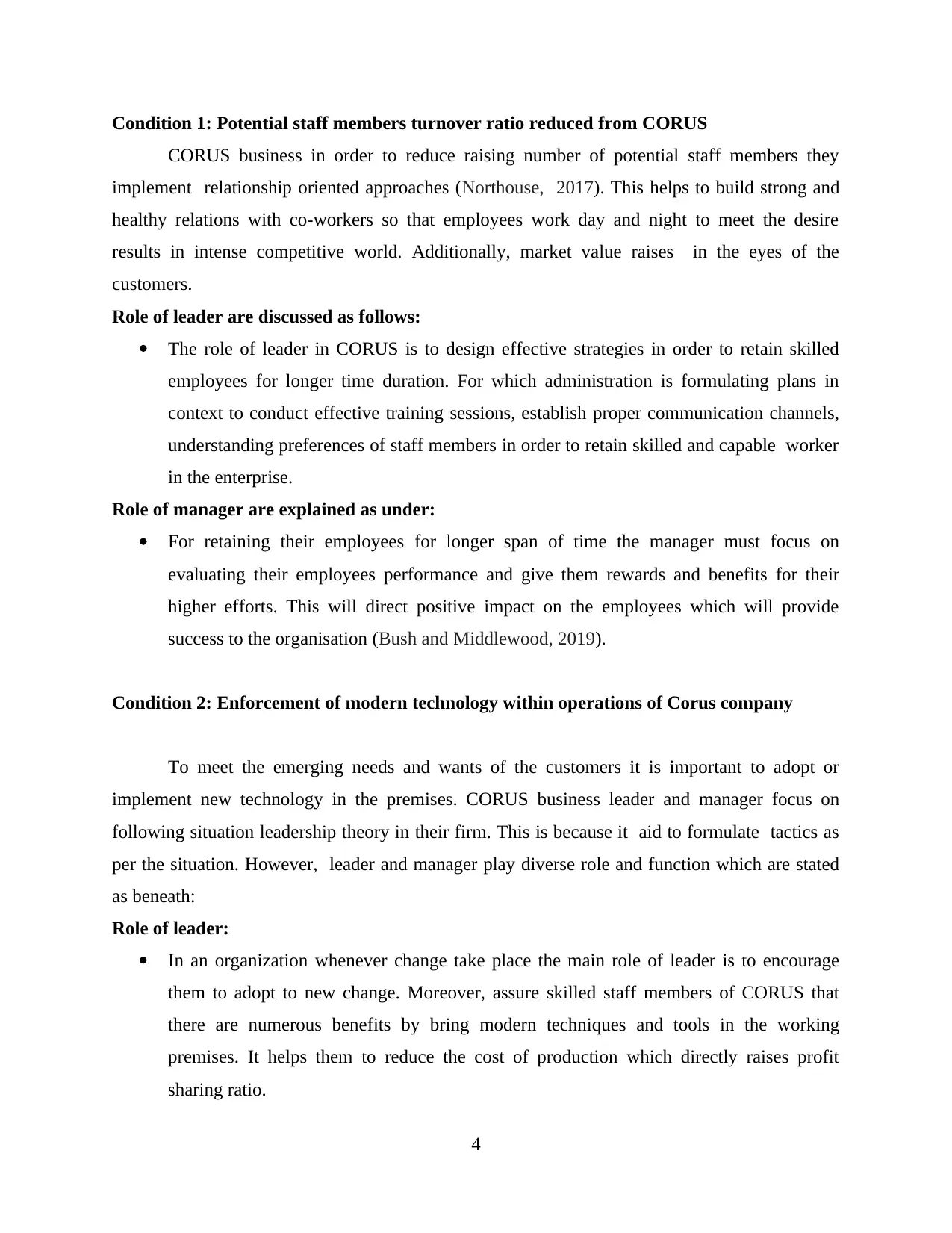
Condition 1: Potential staff members turnover ratio reduced from CORUS
CORUS business in order to reduce raising number of potential staff members they
implement relationship oriented approaches (Northouse, 2017). This helps to build strong and
healthy relations with co-workers so that employees work day and night to meet the desire
results in intense competitive world. Additionally, market value raises in the eyes of the
customers.
Role of leader are discussed as follows:
The role of leader in CORUS is to design effective strategies in order to retain skilled
employees for longer time duration. For which administration is formulating plans in
context to conduct effective training sessions, establish proper communication channels,
understanding preferences of staff members in order to retain skilled and capable worker
in the enterprise.
Role of manager are explained as under:
For retaining their employees for longer span of time the manager must focus on
evaluating their employees performance and give them rewards and benefits for their
higher efforts. This will direct positive impact on the employees which will provide
success to the organisation (Bush and Middlewood, 2019).
Condition 2: Enforcement of modern technology within operations of Corus company
To meet the emerging needs and wants of the customers it is important to adopt or
implement new technology in the premises. CORUS business leader and manager focus on
following situation leadership theory in their firm. This is because it aid to formulate tactics as
per the situation. However, leader and manager play diverse role and function which are stated
as beneath:
Role of leader:
In an organization whenever change take place the main role of leader is to encourage
them to adopt to new change. Moreover, assure skilled staff members of CORUS that
there are numerous benefits by bring modern techniques and tools in the working
premises. It helps them to reduce the cost of production which directly raises profit
sharing ratio.
4
CORUS business in order to reduce raising number of potential staff members they
implement relationship oriented approaches (Northouse, 2017). This helps to build strong and
healthy relations with co-workers so that employees work day and night to meet the desire
results in intense competitive world. Additionally, market value raises in the eyes of the
customers.
Role of leader are discussed as follows:
The role of leader in CORUS is to design effective strategies in order to retain skilled
employees for longer time duration. For which administration is formulating plans in
context to conduct effective training sessions, establish proper communication channels,
understanding preferences of staff members in order to retain skilled and capable worker
in the enterprise.
Role of manager are explained as under:
For retaining their employees for longer span of time the manager must focus on
evaluating their employees performance and give them rewards and benefits for their
higher efforts. This will direct positive impact on the employees which will provide
success to the organisation (Bush and Middlewood, 2019).
Condition 2: Enforcement of modern technology within operations of Corus company
To meet the emerging needs and wants of the customers it is important to adopt or
implement new technology in the premises. CORUS business leader and manager focus on
following situation leadership theory in their firm. This is because it aid to formulate tactics as
per the situation. However, leader and manager play diverse role and function which are stated
as beneath:
Role of leader:
In an organization whenever change take place the main role of leader is to encourage
them to adopt to new change. Moreover, assure skilled staff members of CORUS that
there are numerous benefits by bring modern techniques and tools in the working
premises. It helps them to reduce the cost of production which directly raises profit
sharing ratio.
4
⊘ This is a preview!⊘
Do you want full access?
Subscribe today to unlock all pages.

Trusted by 1+ million students worldwide
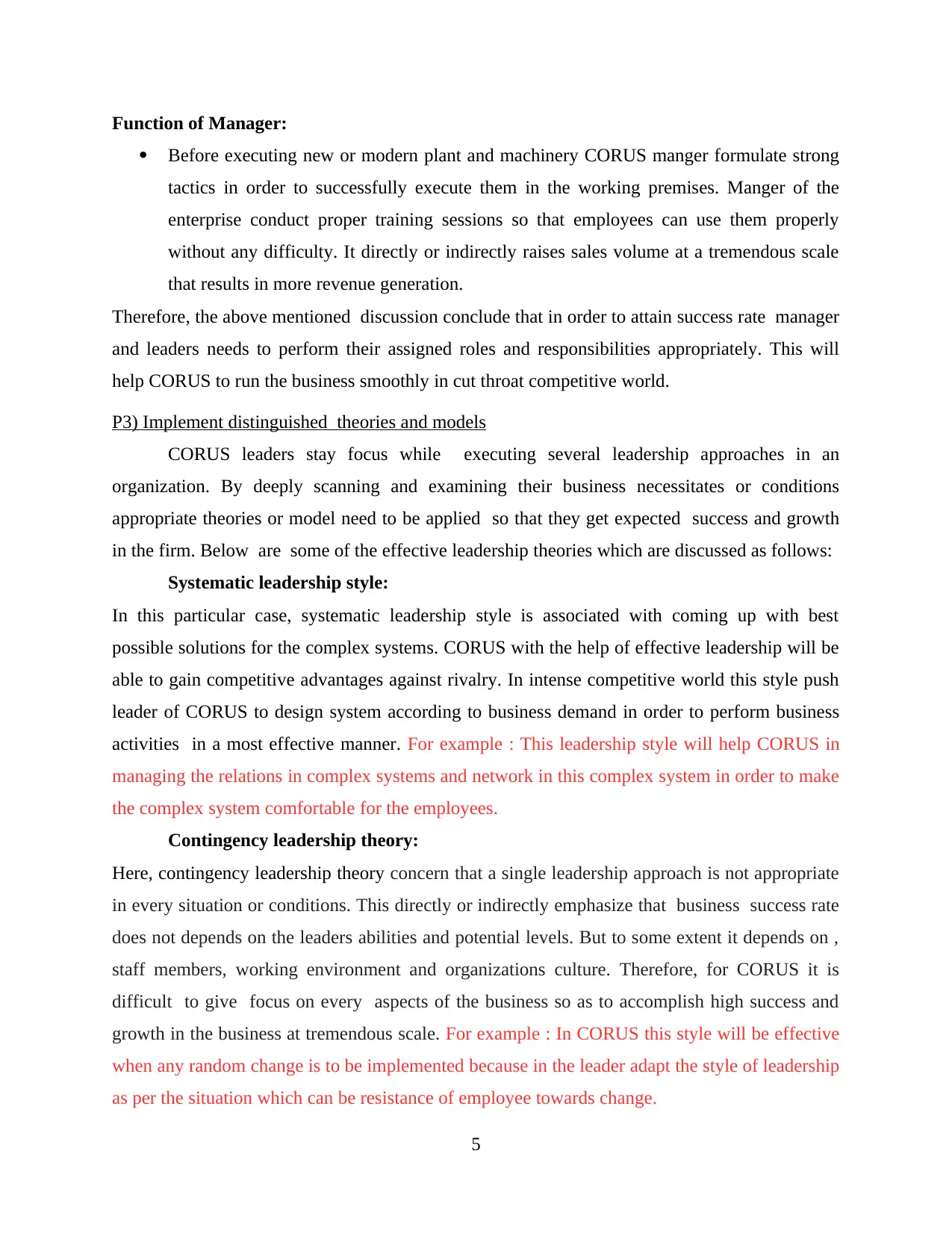
Function of Manager:
Before executing new or modern plant and machinery CORUS manger formulate strong
tactics in order to successfully execute them in the working premises. Manger of the
enterprise conduct proper training sessions so that employees can use them properly
without any difficulty. It directly or indirectly raises sales volume at a tremendous scale
that results in more revenue generation.
Therefore, the above mentioned discussion conclude that in order to attain success rate manager
and leaders needs to perform their assigned roles and responsibilities appropriately. This will
help CORUS to run the business smoothly in cut throat competitive world.
P3) Implement distinguished theories and models
CORUS leaders stay focus while executing several leadership approaches in an
organization. By deeply scanning and examining their business necessitates or conditions
appropriate theories or model need to be applied so that they get expected success and growth
in the firm. Below are some of the effective leadership theories which are discussed as follows:
Systematic leadership style:
In this particular case, systematic leadership style is associated with coming up with best
possible solutions for the complex systems. CORUS with the help of effective leadership will be
able to gain competitive advantages against rivalry. In intense competitive world this style push
leader of CORUS to design system according to business demand in order to perform business
activities in a most effective manner. For example : This leadership style will help CORUS in
managing the relations in complex systems and network in this complex system in order to make
the complex system comfortable for the employees.
Contingency leadership theory:
Here, contingency leadership theory concern that a single leadership approach is not appropriate
in every situation or conditions. This directly or indirectly emphasize that business success rate
does not depends on the leaders abilities and potential levels. But to some extent it depends on ,
staff members, working environment and organizations culture. Therefore, for CORUS it is
difficult to give focus on every aspects of the business so as to accomplish high success and
growth in the business at tremendous scale. For example : In CORUS this style will be effective
when any random change is to be implemented because in the leader adapt the style of leadership
as per the situation which can be resistance of employee towards change.
5
Before executing new or modern plant and machinery CORUS manger formulate strong
tactics in order to successfully execute them in the working premises. Manger of the
enterprise conduct proper training sessions so that employees can use them properly
without any difficulty. It directly or indirectly raises sales volume at a tremendous scale
that results in more revenue generation.
Therefore, the above mentioned discussion conclude that in order to attain success rate manager
and leaders needs to perform their assigned roles and responsibilities appropriately. This will
help CORUS to run the business smoothly in cut throat competitive world.
P3) Implement distinguished theories and models
CORUS leaders stay focus while executing several leadership approaches in an
organization. By deeply scanning and examining their business necessitates or conditions
appropriate theories or model need to be applied so that they get expected success and growth
in the firm. Below are some of the effective leadership theories which are discussed as follows:
Systematic leadership style:
In this particular case, systematic leadership style is associated with coming up with best
possible solutions for the complex systems. CORUS with the help of effective leadership will be
able to gain competitive advantages against rivalry. In intense competitive world this style push
leader of CORUS to design system according to business demand in order to perform business
activities in a most effective manner. For example : This leadership style will help CORUS in
managing the relations in complex systems and network in this complex system in order to make
the complex system comfortable for the employees.
Contingency leadership theory:
Here, contingency leadership theory concern that a single leadership approach is not appropriate
in every situation or conditions. This directly or indirectly emphasize that business success rate
does not depends on the leaders abilities and potential levels. But to some extent it depends on ,
staff members, working environment and organizations culture. Therefore, for CORUS it is
difficult to give focus on every aspects of the business so as to accomplish high success and
growth in the business at tremendous scale. For example : In CORUS this style will be effective
when any random change is to be implemented because in the leader adapt the style of leadership
as per the situation which can be resistance of employee towards change.
5
Paraphrase This Document
Need a fresh take? Get an instant paraphrase of this document with our AI Paraphraser
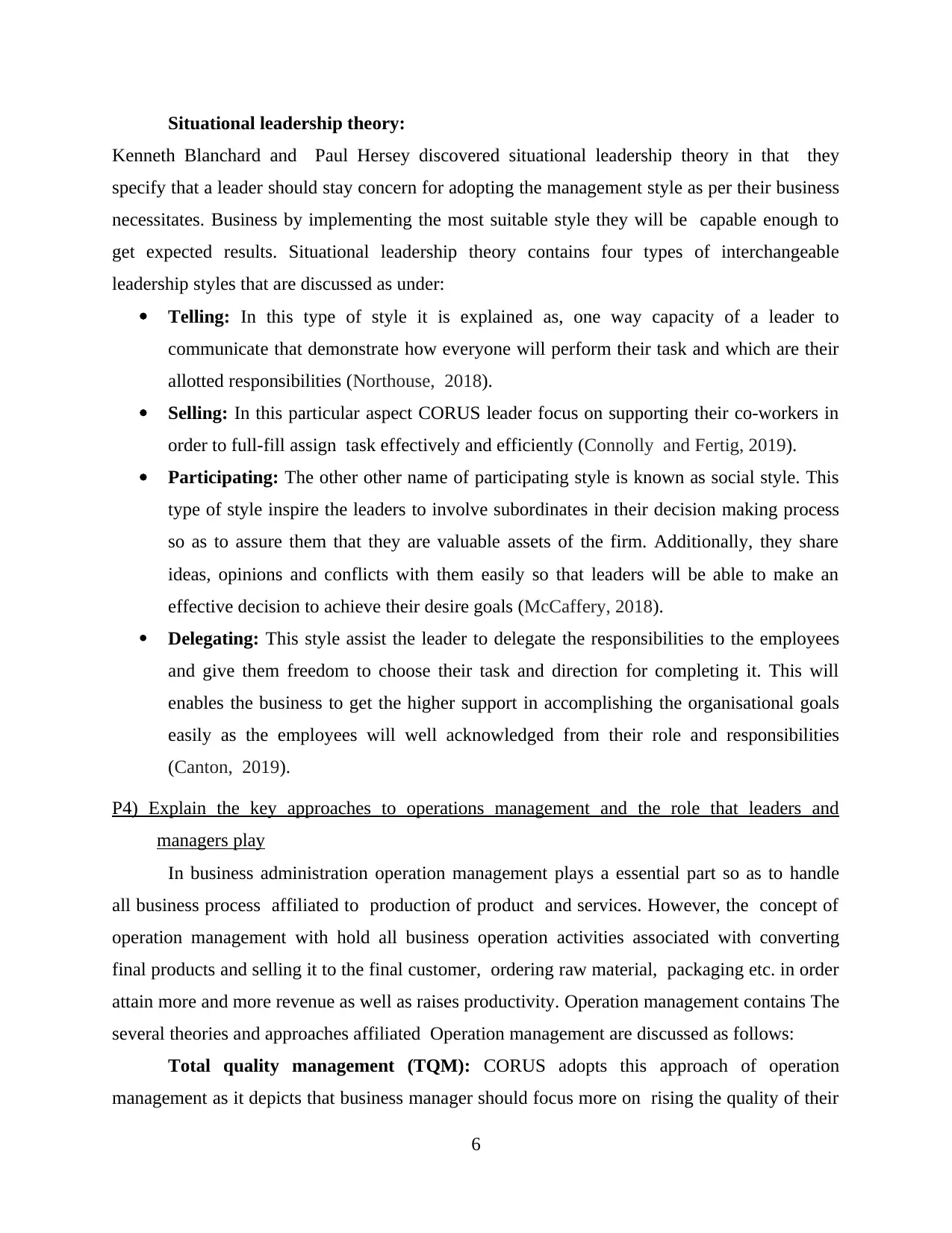
Situational leadership theory:
Kenneth Blanchard and Paul Hersey discovered situational leadership theory in that they
specify that a leader should stay concern for adopting the management style as per their business
necessitates. Business by implementing the most suitable style they will be capable enough to
get expected results. Situational leadership theory contains four types of interchangeable
leadership styles that are discussed as under:
Telling: In this type of style it is explained as, one way capacity of a leader to
communicate that demonstrate how everyone will perform their task and which are their
allotted responsibilities (Northouse, 2018).
Selling: In this particular aspect CORUS leader focus on supporting their co-workers in
order to full-fill assign task effectively and efficiently (Connolly and Fertig, 2019).
Participating: The other other name of participating style is known as social style. This
type of style inspire the leaders to involve subordinates in their decision making process
so as to assure them that they are valuable assets of the firm. Additionally, they share
ideas, opinions and conflicts with them easily so that leaders will be able to make an
effective decision to achieve their desire goals (McCaffery, 2018).
Delegating: This style assist the leader to delegate the responsibilities to the employees
and give them freedom to choose their task and direction for completing it. This will
enables the business to get the higher support in accomplishing the organisational goals
easily as the employees will well acknowledged from their role and responsibilities
(Canton, 2019).
P4) Explain the key approaches to operations management and the role that leaders and
managers play
In business administration operation management plays a essential part so as to handle
all business process affiliated to production of product and services. However, the concept of
operation management with hold all business operation activities associated with converting
final products and selling it to the final customer, ordering raw material, packaging etc. in order
attain more and more revenue as well as raises productivity. Operation management contains The
several theories and approaches affiliated Operation management are discussed as follows:
Total quality management (TQM): CORUS adopts this approach of operation
management as it depicts that business manager should focus more on rising the quality of their
6
Kenneth Blanchard and Paul Hersey discovered situational leadership theory in that they
specify that a leader should stay concern for adopting the management style as per their business
necessitates. Business by implementing the most suitable style they will be capable enough to
get expected results. Situational leadership theory contains four types of interchangeable
leadership styles that are discussed as under:
Telling: In this type of style it is explained as, one way capacity of a leader to
communicate that demonstrate how everyone will perform their task and which are their
allotted responsibilities (Northouse, 2018).
Selling: In this particular aspect CORUS leader focus on supporting their co-workers in
order to full-fill assign task effectively and efficiently (Connolly and Fertig, 2019).
Participating: The other other name of participating style is known as social style. This
type of style inspire the leaders to involve subordinates in their decision making process
so as to assure them that they are valuable assets of the firm. Additionally, they share
ideas, opinions and conflicts with them easily so that leaders will be able to make an
effective decision to achieve their desire goals (McCaffery, 2018).
Delegating: This style assist the leader to delegate the responsibilities to the employees
and give them freedom to choose their task and direction for completing it. This will
enables the business to get the higher support in accomplishing the organisational goals
easily as the employees will well acknowledged from their role and responsibilities
(Canton, 2019).
P4) Explain the key approaches to operations management and the role that leaders and
managers play
In business administration operation management plays a essential part so as to handle
all business process affiliated to production of product and services. However, the concept of
operation management with hold all business operation activities associated with converting
final products and selling it to the final customer, ordering raw material, packaging etc. in order
attain more and more revenue as well as raises productivity. Operation management contains The
several theories and approaches affiliated Operation management are discussed as follows:
Total quality management (TQM): CORUS adopts this approach of operation
management as it depicts that business manager should focus more on rising the quality of their
6

products and services. To capture huge market ratio it is mandatory to get rid of defects at the
time of manufacturing process. In this aspect the leaders needs to render proper guidance and
training to their employees related to improving their working process so that they will be able to
produce products and services with great efficiency which will increase the overall profitability
of the business (Eacott, 2017).
Six sigma : It is an statistical approach which helps the management to improve the
processes, products and services by identifying and eliminating the defects. The managers of
CORUS will use this methodology so that their process will improve which will decrease their
cost and efforts. Their production process will also improve which will ensure reduction in
wastage.
Just in time method(JIT): In open market place it is associated with proper
management of inventory. Moreover, it states that business manager of CORUS needs to build
proportionate balance between their ordered and compulsory stock so that less or no wastage
take place or is either minimised to a large extent . Which leads in raising overall profitability.
Continuous improvement plan: In an organization this approach describes ongoing
efforts of business manager of CORUS so as to uplift its goods and services. To increase success
and growth ratio in open marketplace. To cope up with dynamic environment manager needs to
execute new plant and machinery in their business so that they can increase the overall
sustainability of their business. In this term, the leaders need to motivate its employees to adopt
the changes in their working processes so that the overall profitability and sustainability of the
business can be enhanced.
P5) Discuss importance and value of CORUS operations management in fulfilling set standards
of business
Operation management plays a significant role in assisting an organisation to enhance their
performance as well as profitability in competitive market due to which it is important to
understand the value and importance of operation management. These are described as under:
Evaluation of business activities: It is important to minimise wasteful elements in an
organisation which includes shortage of raw material, overflow of stock and many more. In this,
operation management assist CORUS to identify the needs and requirements so that further
business activities can be executed in efficient manner. This will include employees which must
be motivated to perform without engaging in unlawful events
7
time of manufacturing process. In this aspect the leaders needs to render proper guidance and
training to their employees related to improving their working process so that they will be able to
produce products and services with great efficiency which will increase the overall profitability
of the business (Eacott, 2017).
Six sigma : It is an statistical approach which helps the management to improve the
processes, products and services by identifying and eliminating the defects. The managers of
CORUS will use this methodology so that their process will improve which will decrease their
cost and efforts. Their production process will also improve which will ensure reduction in
wastage.
Just in time method(JIT): In open market place it is associated with proper
management of inventory. Moreover, it states that business manager of CORUS needs to build
proportionate balance between their ordered and compulsory stock so that less or no wastage
take place or is either minimised to a large extent . Which leads in raising overall profitability.
Continuous improvement plan: In an organization this approach describes ongoing
efforts of business manager of CORUS so as to uplift its goods and services. To increase success
and growth ratio in open marketplace. To cope up with dynamic environment manager needs to
execute new plant and machinery in their business so that they can increase the overall
sustainability of their business. In this term, the leaders need to motivate its employees to adopt
the changes in their working processes so that the overall profitability and sustainability of the
business can be enhanced.
P5) Discuss importance and value of CORUS operations management in fulfilling set standards
of business
Operation management plays a significant role in assisting an organisation to enhance their
performance as well as profitability in competitive market due to which it is important to
understand the value and importance of operation management. These are described as under:
Evaluation of business activities: It is important to minimise wasteful elements in an
organisation which includes shortage of raw material, overflow of stock and many more. In this,
operation management assist CORUS to identify the needs and requirements so that further
business activities can be executed in efficient manner. This will include employees which must
be motivated to perform without engaging in unlawful events
7
⊘ This is a preview!⊘
Do you want full access?
Subscribe today to unlock all pages.

Trusted by 1+ million students worldwide
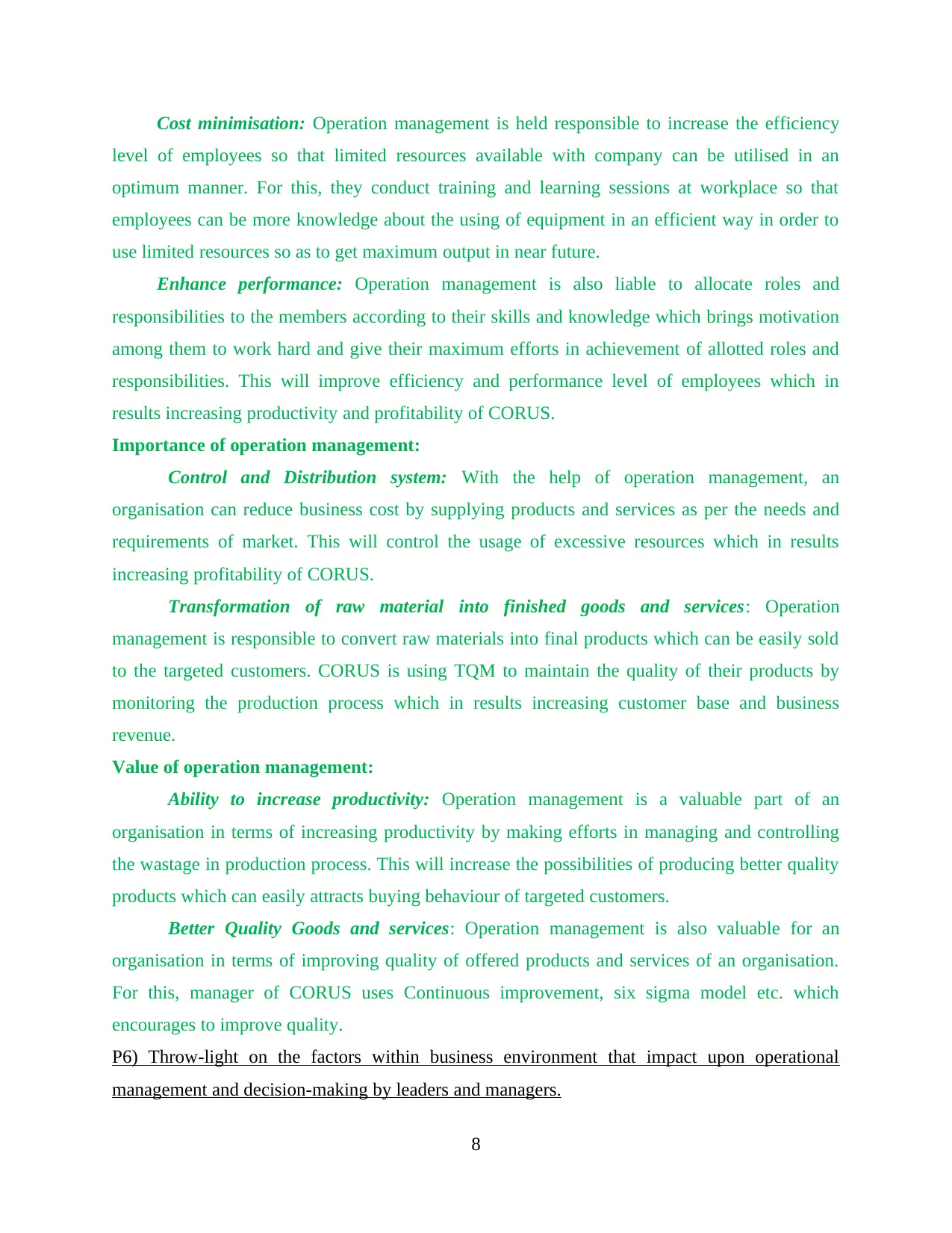
Cost minimisation: Operation management is held responsible to increase the efficiency
level of employees so that limited resources available with company can be utilised in an
optimum manner. For this, they conduct training and learning sessions at workplace so that
employees can be more knowledge about the using of equipment in an efficient way in order to
use limited resources so as to get maximum output in near future.
Enhance performance: Operation management is also liable to allocate roles and
responsibilities to the members according to their skills and knowledge which brings motivation
among them to work hard and give their maximum efforts in achievement of allotted roles and
responsibilities. This will improve efficiency and performance level of employees which in
results increasing productivity and profitability of CORUS.
Importance of operation management:
Control and Distribution system: With the help of operation management, an
organisation can reduce business cost by supplying products and services as per the needs and
requirements of market. This will control the usage of excessive resources which in results
increasing profitability of CORUS.
Transformation of raw material into finished goods and services: Operation
management is responsible to convert raw materials into final products which can be easily sold
to the targeted customers. CORUS is using TQM to maintain the quality of their products by
monitoring the production process which in results increasing customer base and business
revenue.
Value of operation management:
Ability to increase productivity: Operation management is a valuable part of an
organisation in terms of increasing productivity by making efforts in managing and controlling
the wastage in production process. This will increase the possibilities of producing better quality
products which can easily attracts buying behaviour of targeted customers.
Better Quality Goods and services: Operation management is also valuable for an
organisation in terms of improving quality of offered products and services of an organisation.
For this, manager of CORUS uses Continuous improvement, six sigma model etc. which
encourages to improve quality.
P6) Throw-light on the factors within business environment that impact upon operational
management and decision-making by leaders and managers.
8
level of employees so that limited resources available with company can be utilised in an
optimum manner. For this, they conduct training and learning sessions at workplace so that
employees can be more knowledge about the using of equipment in an efficient way in order to
use limited resources so as to get maximum output in near future.
Enhance performance: Operation management is also liable to allocate roles and
responsibilities to the members according to their skills and knowledge which brings motivation
among them to work hard and give their maximum efforts in achievement of allotted roles and
responsibilities. This will improve efficiency and performance level of employees which in
results increasing productivity and profitability of CORUS.
Importance of operation management:
Control and Distribution system: With the help of operation management, an
organisation can reduce business cost by supplying products and services as per the needs and
requirements of market. This will control the usage of excessive resources which in results
increasing profitability of CORUS.
Transformation of raw material into finished goods and services: Operation
management is responsible to convert raw materials into final products which can be easily sold
to the targeted customers. CORUS is using TQM to maintain the quality of their products by
monitoring the production process which in results increasing customer base and business
revenue.
Value of operation management:
Ability to increase productivity: Operation management is a valuable part of an
organisation in terms of increasing productivity by making efforts in managing and controlling
the wastage in production process. This will increase the possibilities of producing better quality
products which can easily attracts buying behaviour of targeted customers.
Better Quality Goods and services: Operation management is also valuable for an
organisation in terms of improving quality of offered products and services of an organisation.
For this, manager of CORUS uses Continuous improvement, six sigma model etc. which
encourages to improve quality.
P6) Throw-light on the factors within business environment that impact upon operational
management and decision-making by leaders and managers.
8
Paraphrase This Document
Need a fresh take? Get an instant paraphrase of this document with our AI Paraphraser
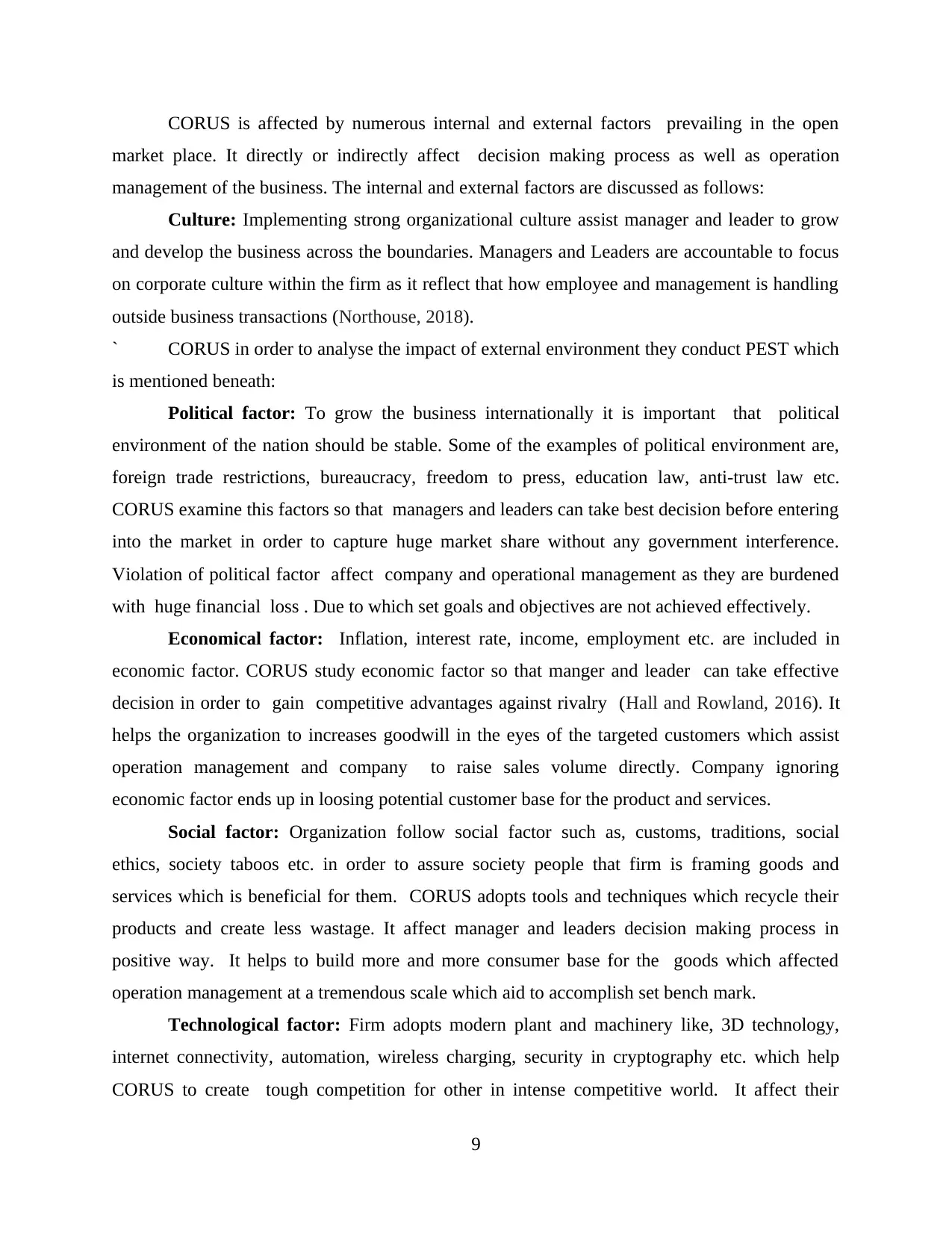
CORUS is affected by numerous internal and external factors prevailing in the open
market place. It directly or indirectly affect decision making process as well as operation
management of the business. The internal and external factors are discussed as follows:
Culture: Implementing strong organizational culture assist manager and leader to grow
and develop the business across the boundaries. Managers and Leaders are accountable to focus
on corporate culture within the firm as it reflect that how employee and management is handling
outside business transactions (Northouse, 2018).
` CORUS in order to analyse the impact of external environment they conduct PEST which
is mentioned beneath:
Political factor: To grow the business internationally it is important that political
environment of the nation should be stable. Some of the examples of political environment are,
foreign trade restrictions, bureaucracy, freedom to press, education law, anti-trust law etc.
CORUS examine this factors so that managers and leaders can take best decision before entering
into the market in order to capture huge market share without any government interference.
Violation of political factor affect company and operational management as they are burdened
with huge financial loss . Due to which set goals and objectives are not achieved effectively.
Economical factor: Inflation, interest rate, income, employment etc. are included in
economic factor. CORUS study economic factor so that manger and leader can take effective
decision in order to gain competitive advantages against rivalry (Hall and Rowland, 2016). It
helps the organization to increases goodwill in the eyes of the targeted customers which assist
operation management and company to raise sales volume directly. Company ignoring
economic factor ends up in loosing potential customer base for the product and services.
Social factor: Organization follow social factor such as, customs, traditions, social
ethics, society taboos etc. in order to assure society people that firm is framing goods and
services which is beneficial for them. CORUS adopts tools and techniques which recycle their
products and create less wastage. It affect manager and leaders decision making process in
positive way. It helps to build more and more consumer base for the goods which affected
operation management at a tremendous scale which aid to accomplish set bench mark.
Technological factor: Firm adopts modern plant and machinery like, 3D technology,
internet connectivity, automation, wireless charging, security in cryptography etc. which help
CORUS to create tough competition for other in intense competitive world. It affect their
9
market place. It directly or indirectly affect decision making process as well as operation
management of the business. The internal and external factors are discussed as follows:
Culture: Implementing strong organizational culture assist manager and leader to grow
and develop the business across the boundaries. Managers and Leaders are accountable to focus
on corporate culture within the firm as it reflect that how employee and management is handling
outside business transactions (Northouse, 2018).
` CORUS in order to analyse the impact of external environment they conduct PEST which
is mentioned beneath:
Political factor: To grow the business internationally it is important that political
environment of the nation should be stable. Some of the examples of political environment are,
foreign trade restrictions, bureaucracy, freedom to press, education law, anti-trust law etc.
CORUS examine this factors so that managers and leaders can take best decision before entering
into the market in order to capture huge market share without any government interference.
Violation of political factor affect company and operational management as they are burdened
with huge financial loss . Due to which set goals and objectives are not achieved effectively.
Economical factor: Inflation, interest rate, income, employment etc. are included in
economic factor. CORUS study economic factor so that manger and leader can take effective
decision in order to gain competitive advantages against rivalry (Hall and Rowland, 2016). It
helps the organization to increases goodwill in the eyes of the targeted customers which assist
operation management and company to raise sales volume directly. Company ignoring
economic factor ends up in loosing potential customer base for the product and services.
Social factor: Organization follow social factor such as, customs, traditions, social
ethics, society taboos etc. in order to assure society people that firm is framing goods and
services which is beneficial for them. CORUS adopts tools and techniques which recycle their
products and create less wastage. It affect manager and leaders decision making process in
positive way. It helps to build more and more consumer base for the goods which affected
operation management at a tremendous scale which aid to accomplish set bench mark.
Technological factor: Firm adopts modern plant and machinery like, 3D technology,
internet connectivity, automation, wireless charging, security in cryptography etc. which help
CORUS to create tough competition for other in intense competitive world. It affect their
9
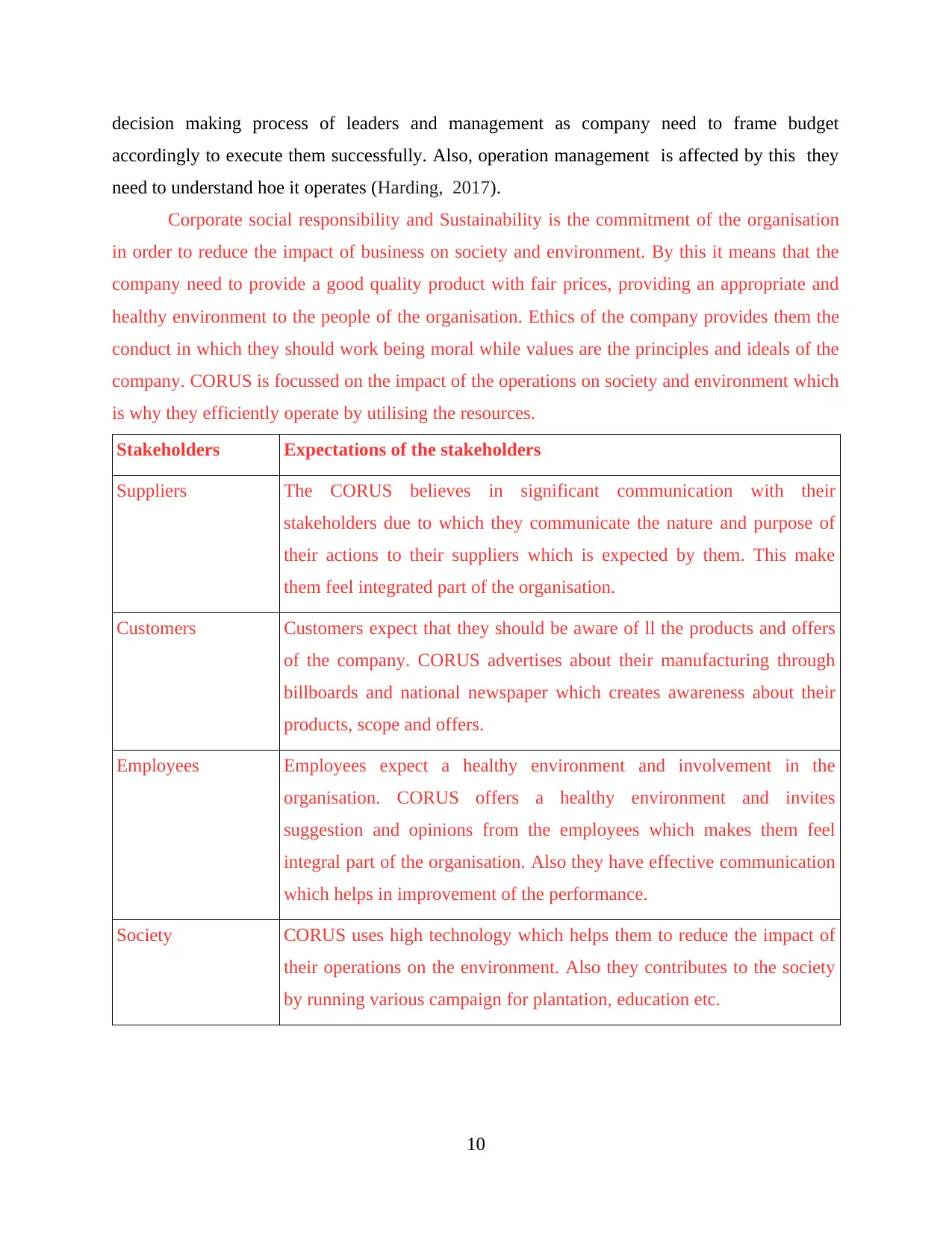
decision making process of leaders and management as company need to frame budget
accordingly to execute them successfully. Also, operation management is affected by this they
need to understand hoe it operates (Harding, 2017).
Corporate social responsibility and Sustainability is the commitment of the organisation
in order to reduce the impact of business on society and environment. By this it means that the
company need to provide a good quality product with fair prices, providing an appropriate and
healthy environment to the people of the organisation. Ethics of the company provides them the
conduct in which they should work being moral while values are the principles and ideals of the
company. CORUS is focussed on the impact of the operations on society and environment which
is why they efficiently operate by utilising the resources.
Stakeholders Expectations of the stakeholders
Suppliers The CORUS believes in significant communication with their
stakeholders due to which they communicate the nature and purpose of
their actions to their suppliers which is expected by them. This make
them feel integrated part of the organisation.
Customers Customers expect that they should be aware of ll the products and offers
of the company. CORUS advertises about their manufacturing through
billboards and national newspaper which creates awareness about their
products, scope and offers.
Employees Employees expect a healthy environment and involvement in the
organisation. CORUS offers a healthy environment and invites
suggestion and opinions from the employees which makes them feel
integral part of the organisation. Also they have effective communication
which helps in improvement of the performance.
Society CORUS uses high technology which helps them to reduce the impact of
their operations on the environment. Also they contributes to the society
by running various campaign for plantation, education etc.
10
accordingly to execute them successfully. Also, operation management is affected by this they
need to understand hoe it operates (Harding, 2017).
Corporate social responsibility and Sustainability is the commitment of the organisation
in order to reduce the impact of business on society and environment. By this it means that the
company need to provide a good quality product with fair prices, providing an appropriate and
healthy environment to the people of the organisation. Ethics of the company provides them the
conduct in which they should work being moral while values are the principles and ideals of the
company. CORUS is focussed on the impact of the operations on society and environment which
is why they efficiently operate by utilising the resources.
Stakeholders Expectations of the stakeholders
Suppliers The CORUS believes in significant communication with their
stakeholders due to which they communicate the nature and purpose of
their actions to their suppliers which is expected by them. This make
them feel integrated part of the organisation.
Customers Customers expect that they should be aware of ll the products and offers
of the company. CORUS advertises about their manufacturing through
billboards and national newspaper which creates awareness about their
products, scope and offers.
Employees Employees expect a healthy environment and involvement in the
organisation. CORUS offers a healthy environment and invites
suggestion and opinions from the employees which makes them feel
integral part of the organisation. Also they have effective communication
which helps in improvement of the performance.
Society CORUS uses high technology which helps them to reduce the impact of
their operations on the environment. Also they contributes to the society
by running various campaign for plantation, education etc.
10
⊘ This is a preview!⊘
Do you want full access?
Subscribe today to unlock all pages.

Trusted by 1+ million students worldwide
1 out of 14
Related Documents
Your All-in-One AI-Powered Toolkit for Academic Success.
+13062052269
info@desklib.com
Available 24*7 on WhatsApp / Email
![[object Object]](/_next/static/media/star-bottom.7253800d.svg)
Unlock your academic potential
Copyright © 2020–2026 A2Z Services. All Rights Reserved. Developed and managed by ZUCOL.





